 In this German folktale (also known as The Magic Porridge Pot), a kind old woman gives a magic pot to a poor girl looking for something to eat in a forest. When someone says special words, the pot cooks sweet porridge. The only problem for the girl, her mother and the village they live in is that you need to say special words to make the pot stop cooking. This is a popular teaching story for 3-5 year-olds, made more so because the poem that inspired it was also the source for a famous Disney film segment. More…
In this German folktale (also known as The Magic Porridge Pot), a kind old woman gives a magic pot to a poor girl looking for something to eat in a forest. When someone says special words, the pot cooks sweet porridge. The only problem for the girl, her mother and the village they live in is that you need to say special words to make the pot stop cooking. This is a popular teaching story for 3-5 year-olds, made more so because the poem that inspired it was also the source for a famous Disney film segment. More…
Archives
The Golden Goose
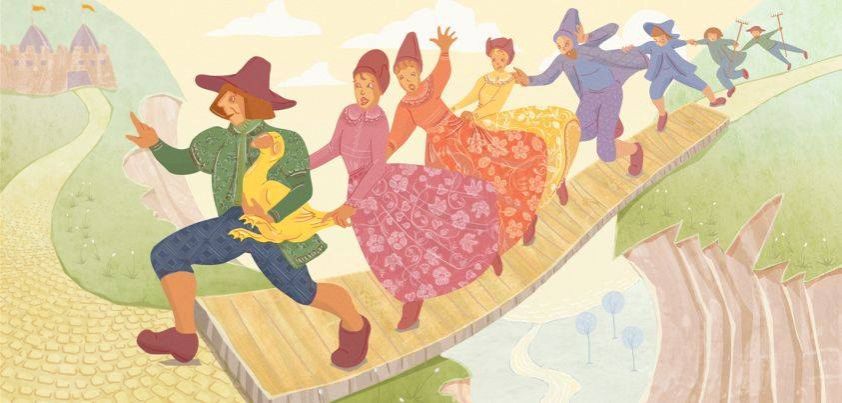 The Golden Goose is about a kind but not very clever young man who one day shares his food with a hungry old man. The old man tells him where to find a goose that has feathers of gold. The goose has a strange power. Those who touch it, and any who touch them, cannot remove their hands. A king, who has a daughter that has never laughed, has promised that she will marry the first man to make do so. The man and goose, with seven people running behind stuck fast to them, look silly enough to do this. More…
The Golden Goose is about a kind but not very clever young man who one day shares his food with a hungry old man. The old man tells him where to find a goose that has feathers of gold. The goose has a strange power. Those who touch it, and any who touch them, cannot remove their hands. A king, who has a daughter that has never laughed, has promised that she will marry the first man to make do so. The man and goose, with seven people running behind stuck fast to them, look silly enough to do this. More…
Tom Tit Tot / Rumpelstiltskin
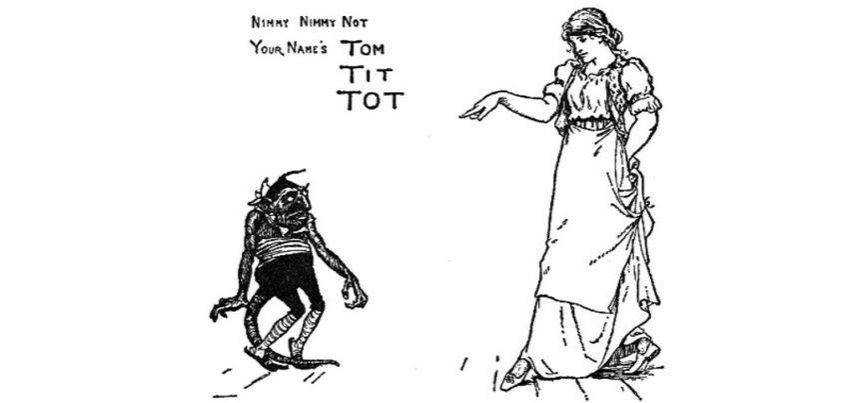 The protagonist in Tom Tit Tot is a lazy girl who doesn’t appear to be good at anything except eating. Her mother lies to the king by saying she is a whiz with the spinning wheel. For some reason this is just the kind of girl the king is looking to marry. The poor girl can’t even spin a top, so in order to avoid losing her head she accepts an offer of help from a small magical creature. As the creature helps the girl, she must try to guess its name. If she can’t, she shall become “its”. More…
The protagonist in Tom Tit Tot is a lazy girl who doesn’t appear to be good at anything except eating. Her mother lies to the king by saying she is a whiz with the spinning wheel. For some reason this is just the kind of girl the king is looking to marry. The poor girl can’t even spin a top, so in order to avoid losing her head she accepts an offer of help from a small magical creature. As the creature helps the girl, she must try to guess its name. If she can’t, she shall become “its”. More…
Cat and Mouse in Partnership
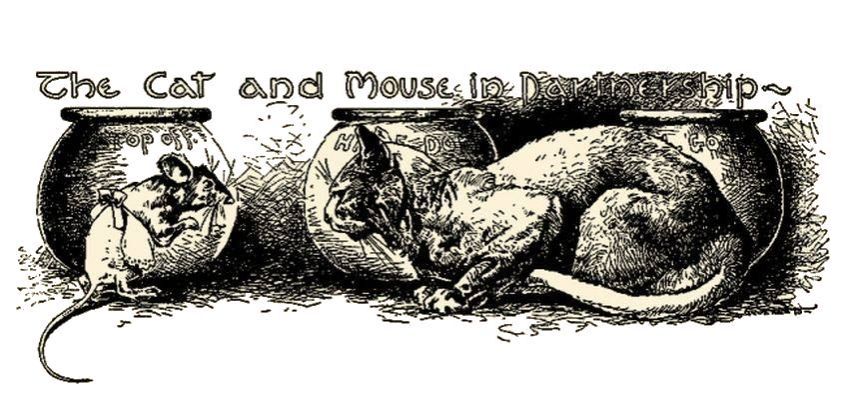 This folktale is about a greedy cat that cheats a trusting friend. A cat and mouse decide to live together. They discover a pot of ‘fat’ (probably dripping) and hide it in a safe place so they will have something to eat over winter. Unfortunately, the cat cannot stop thinking about the pot and empties it well before time. In most folktales, something bad would happen to the cat to teach it a lesson. Not so here! When the mouse complains, the cat does what cats normally do. The moral: You can’t change the natural ways of the world. More…
This folktale is about a greedy cat that cheats a trusting friend. A cat and mouse decide to live together. They discover a pot of ‘fat’ (probably dripping) and hide it in a safe place so they will have something to eat over winter. Unfortunately, the cat cannot stop thinking about the pot and empties it well before time. In most folktales, something bad would happen to the cat to teach it a lesson. Not so here! When the mouse complains, the cat does what cats normally do. The moral: You can’t change the natural ways of the world. More…
Brother and Sister
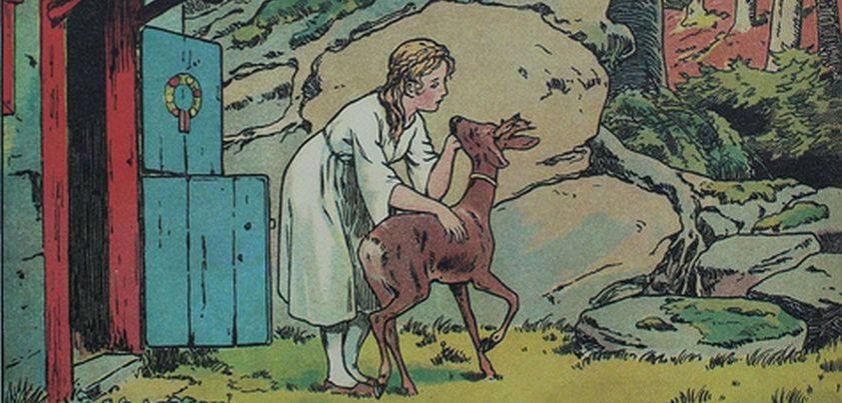 This is a well-known European folktale. A brother and sister run away from home after years of being badly treated by (you guessed it!) their wicked stepmother. The stepmother also happens to be a witch, and the children have some unlikely adventures. The brother is turned into a deer that loves nothing better than to be hunted. The sister becomes a Queen, has a baby, and is murdered by (you guessed it!) the wicked stepmother. Fortunately, the sister’s ghost comes back to life, the brother is made normal again, and they all (except the wicked stepmother) live happily ever after. More…
This is a well-known European folktale. A brother and sister run away from home after years of being badly treated by (you guessed it!) their wicked stepmother. The stepmother also happens to be a witch, and the children have some unlikely adventures. The brother is turned into a deer that loves nothing better than to be hunted. The sister becomes a Queen, has a baby, and is murdered by (you guessed it!) the wicked stepmother. Fortunately, the sister’s ghost comes back to life, the brother is made normal again, and they all (except the wicked stepmother) live happily ever after. More…
The Town Musicians of Bremen
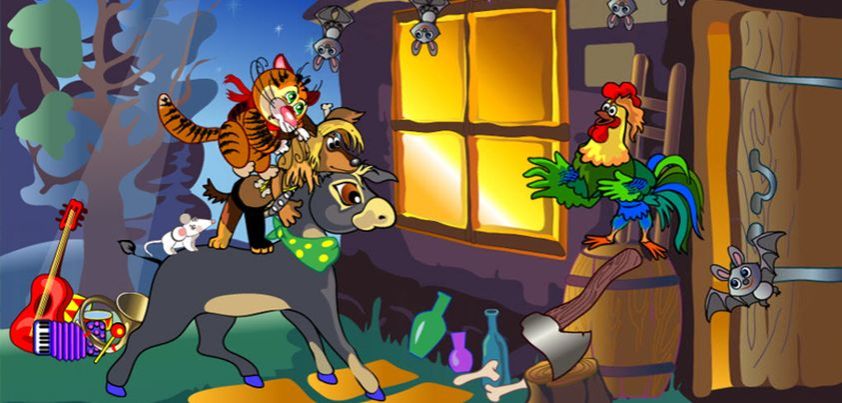 The Town Musicians of Bremen is a story about four animals that have worked hard all their lives. They are now too old to work and face either being badly treated or killed by their owners. One by one they leave their homes and set out together to become musicians in the town of Bremen. However, they never reach Bremen. During the journey, the animals come upon a house owned by a band of robbers. By working together, they are able to frighten the robbers away and live happily in the house for the rest of their days. More…
The Town Musicians of Bremen is a story about four animals that have worked hard all their lives. They are now too old to work and face either being badly treated or killed by their owners. One by one they leave their homes and set out together to become musicians in the town of Bremen. However, they never reach Bremen. During the journey, the animals come upon a house owned by a band of robbers. By working together, they are able to frighten the robbers away and live happily in the house for the rest of their days. More…
Wise Folks
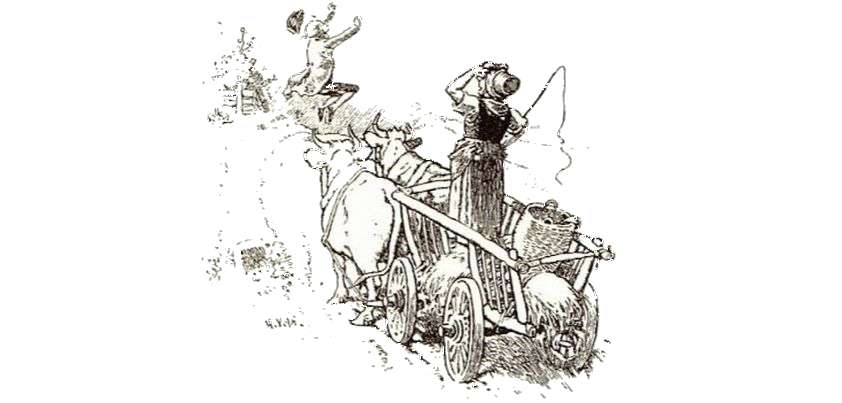 In this folktale (aka The Clever People), a cruel farmer is angry with his wife because she was cheated out of two cows. He promises not beat her for it if can find someone more foolish. He soon finds one: a widow who is worried about how well her dead husband is doing in Heaven. The farmer makes up for losing his cows by cheating the widow out of a bag of money and stealing a horse from her son. At the end of the story, he seems to think that it is OK to cheat foolish people. More…
In this folktale (aka The Clever People), a cruel farmer is angry with his wife because she was cheated out of two cows. He promises not beat her for it if can find someone more foolish. He soon finds one: a widow who is worried about how well her dead husband is doing in Heaven. The farmer makes up for losing his cows by cheating the widow out of a bag of money and stealing a horse from her son. At the end of the story, he seems to think that it is OK to cheat foolish people. More…
Sleeping Beauty
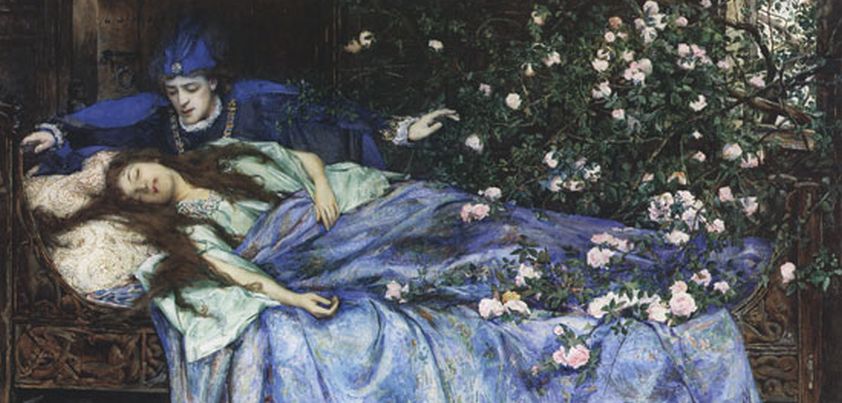 Today we have a reverse chronology of the folktales behind the classic children’s story, Sleeping Beauty. The famous kiss that woke the princess comes from the Brothers Grimm’s Briar-Rose (1812). Charles Perrault’s Sleeping Beauty in the Wood (1697) has no kiss but lots of talk, a hasty wedding followed by a night of “very little sleep”, and an added section where the prince’s mother (an Ogress) decides to make a meal of their children. Perault’s inspiration was the Giambattista Basile’s Sun, Moon and Talia (1634). Here, the king “gathers the first fruits of love” (rapes) the poor unconscious girl. More…
Today we have a reverse chronology of the folktales behind the classic children’s story, Sleeping Beauty. The famous kiss that woke the princess comes from the Brothers Grimm’s Briar-Rose (1812). Charles Perrault’s Sleeping Beauty in the Wood (1697) has no kiss but lots of talk, a hasty wedding followed by a night of “very little sleep”, and an added section where the prince’s mother (an Ogress) decides to make a meal of their children. Perault’s inspiration was the Giambattista Basile’s Sun, Moon and Talia (1634). Here, the king “gathers the first fruits of love” (rapes) the poor unconscious girl. More…
The Ass, the Table, and the Stick
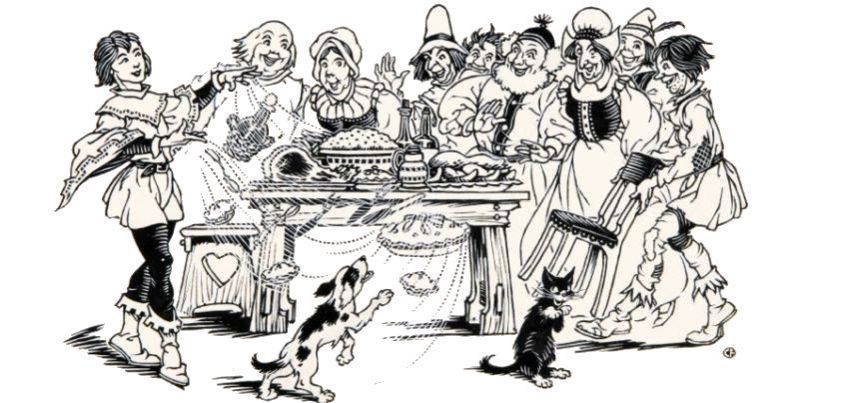 In this English folktale, a young man works for a year and earns a magic donkey. An innkeeper tricks him out of it, so he works for another year and earns a magic table. The same innkeeper tricks him out of this. For his next job, the boy earns a magic stick. This helps the young man get his donkey and table back, as well as to marry his true love. Unfortunately, in winning the girl the young man shows a side of his personality that will make readers wonder if he really deserved all the magical help! More…
In this English folktale, a young man works for a year and earns a magic donkey. An innkeeper tricks him out of it, so he works for another year and earns a magic table. The same innkeeper tricks him out of this. For his next job, the boy earns a magic stick. This helps the young man get his donkey and table back, as well as to marry his true love. Unfortunately, in winning the girl the young man shows a side of his personality that will make readers wonder if he really deserved all the magical help! More…
King Thrushbeard
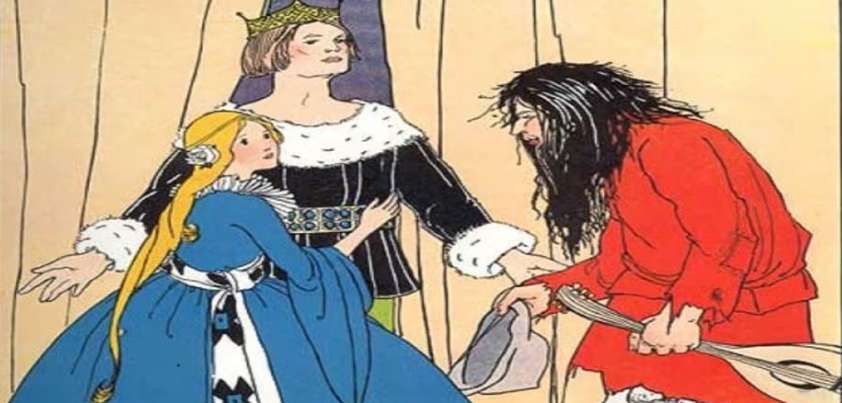 The Brothers Grimm would have us believe that this folktale teaches a valuable lesson by documenting the fall of a spoiled princess who judges potential suitors by looks alone and is so ill-mannered that she says cruel things about them to their faces. Through her punishment (being married to a beggar street musician), we also learn that she has almost no household or practical skills. I’m not sure though about the central idea that the best way to teach humility is to publicly humiliate a person. Isn’t this what the princess was punished for at the beginning of the story? More…
The Brothers Grimm would have us believe that this folktale teaches a valuable lesson by documenting the fall of a spoiled princess who judges potential suitors by looks alone and is so ill-mannered that she says cruel things about them to their faces. Through her punishment (being married to a beggar street musician), we also learn that she has almost no household or practical skills. I’m not sure though about the central idea that the best way to teach humility is to publicly humiliate a person. Isn’t this what the princess was punished for at the beginning of the story? More…
The Master Thief
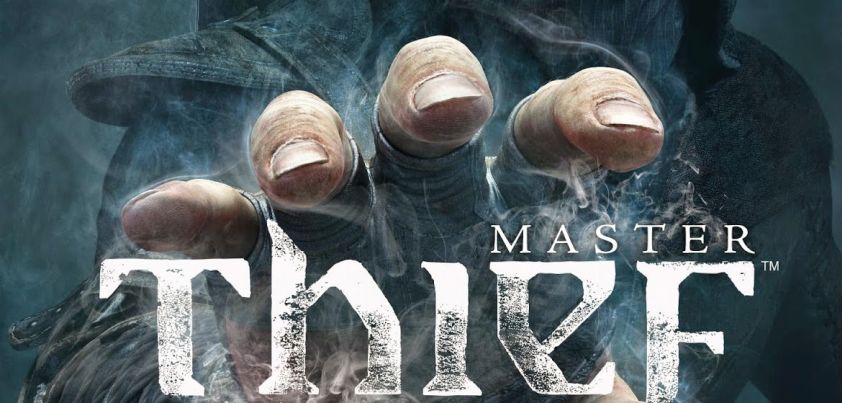 This Norwegian folktale is about a young man whose poor father sends him out into the world to earn a living. He joins a group of robbers, and is so good at stealing that he becomes their leader. The Master Thief returns home a rich man and decides to marry the Governor’s daughter. In order to marry the girl, he must prove how good a thief he is. This story goes against the English idiom: Crime doesn’t pay. The moral seems to be that crime does pay… but only if you are very good at it! More…
This Norwegian folktale is about a young man whose poor father sends him out into the world to earn a living. He joins a group of robbers, and is so good at stealing that he becomes their leader. The Master Thief returns home a rich man and decides to marry the Governor’s daughter. In order to marry the girl, he must prove how good a thief he is. This story goes against the English idiom: Crime doesn’t pay. The moral seems to be that crime does pay… but only if you are very good at it! More…
The Fisherman and His Wife
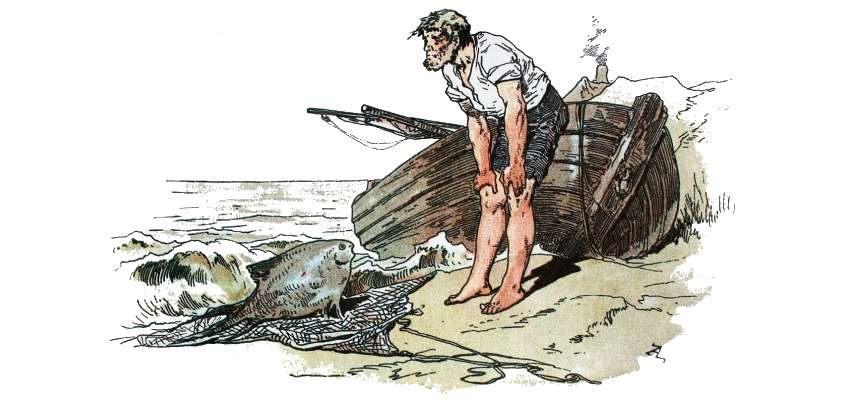 It’s time for another folktale. This one is about dissatisfaction and greed. A poor fisherman catches an enchanted fish and sets it free. When he tells his wife, she is angry that he did not demand a wish in return. She sends him to ask the fish for a nicer house. When the fish grants this, the wife becomes greedy. She sends her husband back several times to ask for bigger and bigger things. Her final wish is so outrageous that the fish either will not or cannot grant it. The fisherman is no doubt happy with what happens next. More…
It’s time for another folktale. This one is about dissatisfaction and greed. A poor fisherman catches an enchanted fish and sets it free. When he tells his wife, she is angry that he did not demand a wish in return. She sends him to ask the fish for a nicer house. When the fish grants this, the wife becomes greedy. She sends her husband back several times to ask for bigger and bigger things. Her final wish is so outrageous that the fish either will not or cannot grant it. The fisherman is no doubt happy with what happens next. More…